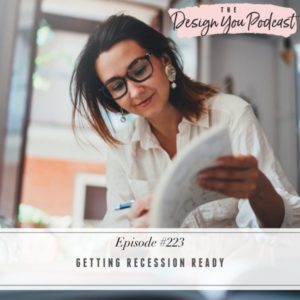
Nobody wants to think about a recession, and it is a topic that scares a lot of people, especially business owners. But with high inflation, out-of-control gas prices, and raised interest rates, it is something that we need to consider as a real possibility.
It is remarkable what happens when a recession or impending one gets your attention. Now, I don’t pretend to be an economist, but there are some things I do know for sure that can help small businesses get ready for a potential recession, and I’m sharing them with you this week.
Join me this week as I give you a short, generalized version of what is currently happening in the economy and why the best time to prepare for a potential recession is right now. I’m sharing some things you might want to think about in your business, and how to get ready so that if we do move into a recession, you can survive it and eventually move back into the space of thriving.












